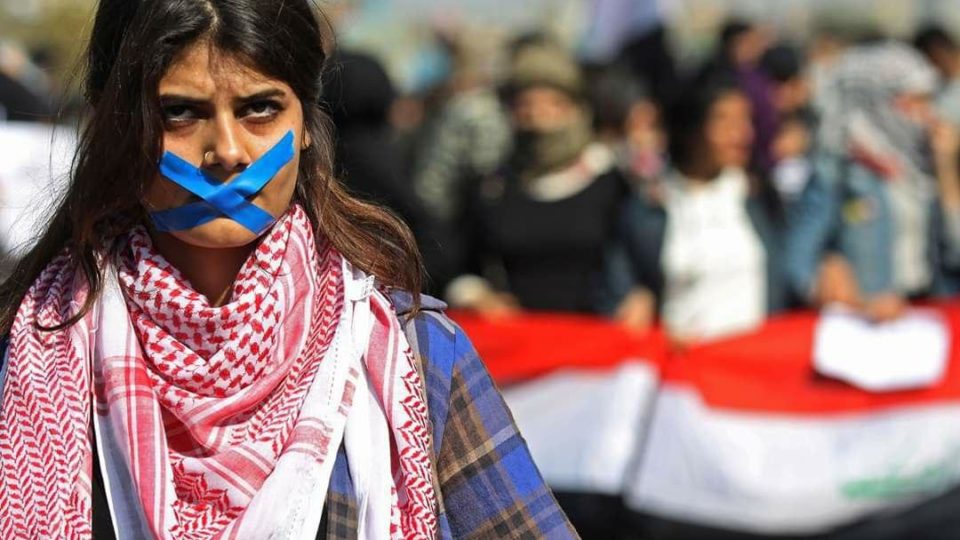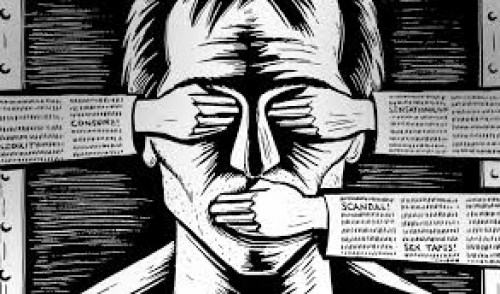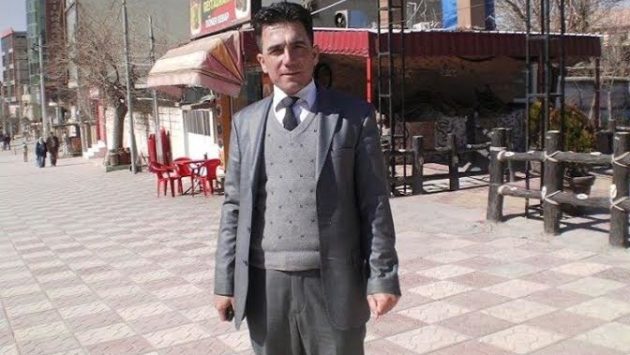Threats to Journalists and a Free Press Rise in Iraq
Freedom of the press and freedom of expression are facing serious threats in Iraq, according to a new report of the Iraqi Women Journalists’ Forum (IWJF). The Forum has recorded more than 100 instances of killings and serious threats against journalists; in addition, 32 media outlets have been subjected to blackmail and defamation. All of this poses a great risk to the future of civil society and democracy in Iraq. The IWJF identifies three major areas of concern:
• Failure to guarantee the safety of media workers;
• Government intrusion into media organizations that has seriously undermined independent media and a free press;
• High levels of discrimination against and harassment of female media workers.
The Report of the Iraqi Women Journalists’ Forum for 2019-2020 Baghdad
May 3, 2020
World Press Freedom Day is an opportunity to remind the world in general and Iraqis in particular of the importance of the safety and protection of press freedom stipulated in the Universal Declaration of Human Rights as a basic human right, as well as guaranteed by the Iraqi constitution in Article 38.
Areas experiencing conflict – or post-conflict – are very dangerous environments for journalists. Violence against journalists has become one of the greatest threats to freedom of expression, and journalists who risk their lives to provide and document information need support for the risks they face as a result of their search for information, news reporting, and the formation of public opinion, especially when it comes to corruption files and coverage of demonstrations, which clearly affirmed that freedom of the press and freedom of expression cannot be achieved without a basic measure of security and institutional work.
The period from May 4, 2019 to May 2, 2020 witnessed an escalation of violence against the fourth estate in Iraq and witnessed incidents of repression, threats, kidnappings, killings, blackmail and defamation of women and men journalists working in various cities of Iraq, which were an obstacle to practicing their profession in a manner that is appropriate to their mission and the work that they do.
Also, some government entities have restricted their freedom and prevented them from covering important events, such as the demonstrations that started on the first of October last year. The accompanying cut off of Internet service and the blocking of some social networking sites in most Iraqi provinces further undermined journalists’ reporting.
The report prepared by IWJF recorded numerous attacks on journalists and local media. This includes more than 100 cases of killing, threatening, kidnapping, beating and arrest, including 11 cases of killing journalists and 32 cases of threats, defamation, and blackmail of Iraqi women journalists working in media institutions with different specialties, some of them mentioned by their names, and others refused for security and personal reasons. This is a dangerous indication in a country that is supposed to have transformed from a dictatorial regime to a democracy.
A table of the most notable cases recorded from May 2019 through April 2020 follows:
| Date | Situation | |
| 1 | 21 May 2019 | A group of journalists is threatened with death by unknown entities in Samarra Governorate |
| 2 | 26 May | Security forces prevent media organizations from covering the vigil at Karbala University |
| 3 | 28 May | The legal clinic registered in the forum a case of defamation and blackmail and creating fake webpages for the women journalist who work in one of the TV channels to defame her reputation |
| 4 | 30 May | The Arabic NRT channel team was prevented from filming in Baghdad by the security forces |
| 5 | 25 June | Arab Nrt channel was prevented from entering the parliament to cover sessions |
| 6 | 6 July | Journalist Haider al-Hamdani in al-Muthanna was threatened with death and wrote on his apartment door, “Wanted”. |
| 7 | 8 July | The legal clinic registers in the forum, a women TV presenter was subjected to a cyber-crime by unknown entities. |
| 8 | 13 July | Asia Channel reporter Ehab Najem has been threatened with death by unknown entities. |
| 9 | 18 July | Ahmed Al-Zawiti, director of the “Al-Jazeera” network office in Erbil, was beaten by the security forces while covering the armed attack on the Turkish consulate. |
| 10 | 25 July | A group of media professionals and journalists are subjected to a campaign of defamation and threats through social media sites by unknown entities. |
| 11 | 26 July | An unknown force raided the house of journalist Hani Al-Baroudi, an Egyptian residing in Iraq, and took him to an unknown destination. |
| 12 | 18 August | The media, Hamsa Majed, was publicly attacked and harassed by a group of armed youth. |
| 13 | 28 August | Security forces in Sulaymaniyah detained a TV reporter working for the Kurdish NRT channel after covering a voluntary partisan campaign to maintain roads in the city. |
| 14 | 29 August | The legal clinic records the dismissal of a female reporter working for a news agency after being subjected to harassment in the institution she works in Baghdad |
| 15 | 2 September | Publishing a list of names and pictures of a journalists and bloggers by unknown entities on social media and incitement to kill them on charges of spying and working with foreign parties. |
| 16 | 2 September | The suspension of Al-Hurra channel in Baghdad for 90 days by a decision by the Media and Communications Authority, because of a report broadcast by the channel, it believes that it offended religious symbols and institutions. |
| 17 | 3 September | A group of journalists was beaten by the security forces in Salah al- Din Governorate Council, during their coverage of a conference held by the President of the Governorate Council. |
| 18 | 6 September | Yara News editor Zaid al-Jubouri in Baghdad was threatened and his family following a report he published on financial and administrative corruption. |
| 19 | 2 October | The security forces arrest the Al-Rashid TV team, consisting of reporter Ahmed al-Rikabi, reporter Arshad al-Hakim and cameraman Ali Fadel, during live coverage of the demonstrations in Baghdad. |
| 20 | 4 October | Cameraman Hisham Faris al-Adhami was killed while covering a demonstration in Baghdad. |
| 21 | 5 October | TV channels (Dijla, NRT, Al-Arabia, Al-Hadath, Al-Ghad and TRT) are subjected to burning and vandalism by unknown entities due to their coverage of the demonstrations. |
| 22 | 6 October | Alfurat channel was subjected to sabotage and missile bombing by unknown entities due to its coverage of the demonstrations |
| 23 | 6 October | Al-Jazeera cameraman kidnapped, tortured and then released, while covering a news conference for Iraqi politician “Azzam Al-Tamimi”. |
| 24 | 12 October | Yazdi 24 Media Foundation is exposed to a campaign of narrowing their work in the Kurdistan region, by political personalities and institutions. |
| 24 | 12 October | Yazdi 24 Media Foundation is exposed to a campaign of narrowing their work in the Kurdistan region, by political personalities and institutions. |
| 25 | 15 October | Journalist Amanj Babani, his journalist wife, and their son were killed publicly by unknown gunmen in Sulaimaniyah, |
| 26 | 17 October | The blogger and human rights activist Shuja’a Al-Khafaji was arrested by unknown armed forces after broken into his house in Baghdad. |
| 27 | 25 October | Four journalists in Baghdad were wounded by security forces fire during their coverage of the demonstrations, and they are the reporte of Alsumaria TV channel, Hisham Waseem and the reporter of the Altaghier Channel, Muhammad al-Samarrai, in addition to wounding (2) employees of German television ZDF. |
| 28 | 27 October | A woman journalist and activist was threatened with death through contacts from unknown destinations as a result of her participation in the demonstrations |
| 29 | 28 October | woman journalists Heba Al-Majid, Zainab Al-Ali and Manar Qassem were injured by tear gas while covering the demonstrations in Karbala, as well as the arrest of reporters Muhammad Al-Asadi and Tariq Al-Tarfi by the security forces in the province |
| 30 | 4 November | Hona Baghdad TV team was beaten by riot police while covering the demonstrations in Baghdad |
| 31 | 7 November | Journalist Amjad Al-Dahamat was assassinated near his house in Maysan Governorate. |
| 32 | 17November | The legal clinic records the exposure of three women journalists to violence, threats, intimidation and electronic blackmail as a result of their publications on social media that support the demonstrations |
| 33 | 18November | Unknown entities kidnapped Mohammed Al-Shammari, reporter of Baghdad alyaum Agency, after receiving several threats since the start of the demonstrations |
| 34 | 23November | The Media and Communications Commission decided to stop the operation of 9 local and international TV stations, and to warn 5 other TV stations because of its coverage of the demonstrations in the cities of southern and central Iraq. |
| 35 | 30November | Journalist Khalil Abd alJumaili was arrested by police intelligence officers in Fallujah after he posted a tweet that indicated his support for the demonstrations. |
| 36 | 6 December | Cameraman Ahmed Muhanna was killed while covering the demonstrations in Baghdad. |
| 37 | 10 Jan 2020 | Dijla TV channel reporter Ahmed Abdul Samad and cameraman Safaa Al-Tamimi were killed while covering the demonstrations in Basra Governorate. |
| 38 | 13 January | A female journalist was threatened with dismissal from her work as a result of her participation in the demonstrations |
| 39 | 15 January | Munther Al-Jubouri, the reporter of Al-Ayyam channel in Babylon, was pursued by unknown persons after returning from covering the demonstrations. |
| 40 | 19 January | Journalist Jawad Al-Khurasan was assassinated in Baghdad. |
| 41 | 21 January | Cameraman Youssef Sattar was killed while covering a demonstration in Baghdad |
| 42 | 28 January | Dijla TV channel was closed by the Ministry of Interior by a decision of the Media and Communications Authority |
| 43 | 28 January | Dr. Muhammad Hussein Alwan, a professor of media at Al- Mustansiriya University, was killed in Baghdad by unknown entities. |
| 44 | 31 January | An assassination attempt on the presenter who works in Asia Channel, Adel Ishtiaq, by masked gunmen in Baghdad. |
| 45 | 1 February | The disappearance of journalist Mazen Latif in mysterious circumstances in Baghdad, and it is not known yet whether he was arrested, or kidnapped and the reasons behind it. |
| 46 | 12 February | The supervisor of Al- Rashid channel, Nizar Thanoon, was killed by unknown entities. |
| 47 | 12 February | Subul Al-Salam radio reporter, Safaa Al-Kanani, was detained by the intelligence agency in Dhi Qar while he was covering the bombing incident in the province. |
| 48 | 21 February | A French Press Agency cameraman was targeted by “riot” while covering the demonstrations in Baghdad. |
| 49 | 23 February | The attack on the director of the NTR channel in Kirkuk, Nebz Miqdad, by security forces while he was covering the demonstration. |
| 50 | 9 March | The kidnapping of the editor of Al-Sabah newspaper, Tawfiq Al- Tamimi, while he was going to his work in Baghdad, and until now, his fate is unknown. |
| 51 | 25 March | The arrest of the reporter of the Baghdad Alyaum Agency , Hassan Sabah, by the intelligence agency in Basra |
| 52 | 31 March | Director of Al-Mallawiyah TV station, Muhammad al-Samarrai, was attacked by security forces in Samarra |
| 53 | 3 April | Inclusion of journalists and the media by means of a curfew, recommended by the Media and Communications Authority |
| 54 | 3 April | Media and Communications Commission suspended Reuters news agency work due to a report related to Corona virus |
| 55 | 7 April | Al-Sumaria TV reporter in Diyala, Hadi Al-Anbaki, was attacked by the director of Diyala’s health, after he covered the health situation in the province |
| 56 | 28 April | Security forces prevent Dijla Channel team from covering the demonstrations in the Rifai area in Dhi Qar |
According to these statistics, the IWJF reports that freedom of the press is being undermined in three major areas:
First: The safety and protection of workers in the media sector:
The figures recorded by IWJF reflect the size of the harassment of women journalists in Iraq, and that the work environment is witnessing high rates of violence, especially in the stage of demonstrations that started since October last year, and these attacks did not stop at the borders of journalists and media workers only, but targeted activists, and bloggers also, this is due to several reasons:
- Legislations and laws are inconsistent with the constitution
- Security insecurity due to the high rates of armed groups that kidnap, kill and threaten 3- Failure to disclose the perpetrators, which led to impunity
- Not to amend the journalists ’rights law, which was approved in 2011.
- Non- legislation of the low of the right to obtain information.
- Failure to abide by international agreements and covenants that guarantee freedom of the press, safety of journalists, and freedom of expression.
- The non-legislation of the freedom to demonstrate and peaceful assembly law.
Second: Freedom of the press and the independence of media organizations:
IWJF recorded obstructing the work of media organizations because of decisions issued by the Media and Communications Authority, where more than ten TV channels were closed during the demonstrations, and some channels were prevented from media coverage in some regions, and large numbers of workers in those institutions were also laid off due to the economic situation and the lack of Funding, for example, Shafaq News stopped working due to lack of financial support after 16 years of journalistic work.
IWJF concluded that Iraq still lacks independent media, as most of the operating channels are affiliated with political parties, In addition to the interference of political support to finance some of the channels that represent the independent axis, especially after the lack of funding and the high rates of harassment, threats and blackmail, even the state’s media that represented by the Iraqi media network, great pressure is exerted on it, which led to the fact that the media produced is of a partisan and governmental nature.
Also, the network law has not been implemented yet, and the network’s board of trustees is appointed according to partisan quotas away from independence, in addition to all of that the report recorded challenges related to the freedom of the electronic press after the arrest of a number of bloggers and the closure of websites that revealed corruption files and covered violations that happened during demonstrations and the high rate of electronic blackmail happen by unknown entities, and the largest group that has been subjected to this type of harassment is the women media because of the tribal and male nature of society.
Third: Taking into account gender and gender equality in the media field
The legal clinic IWJF recorded 32 cases of blackmail and defamation of Iraqi women journalists, most of which were through social media sites. Female journalists complained of frequent harassment and bargaining. Some of them also pointed to discrimination on the basis of gender in media institutions, and the administration and head of departments in institutions are often in the interests of men, not women.
IWJF also recorded, during the reporting period, the lack of commitment to implementing the quota in the Board of Trustees of the Iraqi Media Network, which is supposed to be one third according to law, that is, two women out of the 6 members who make up the Council, but the quota policy and the lack of application of the law led to the Board of Trustees remaining without a real representation of women.
And the statistics and complaints received by the legal clinic in the forum prove that a number of women journalists have been threatened because of their participation in the demonstrations, and they have been informed by some authorities to leave the demonstration squares because their stay will expose them to death or kidnapping, as happened with other workers in this field.
The current reality of the female media workers can be summarized according to the report’s data:
- The high incidence of blackmail and defamation on social media and the failure to legislate the Information Crime Law
- The prevailing masculine view and the prevalence of traditional concepts dealing with women as a weak being that can be exploited through defamation of reputation.
- The high rates of female workers in the media field who do not have experience and competence due to personal, partisan and factional relationships.
- Reflecting a negative image of the media woman due to the appointment of non-media women to work in some media institutions and appearing inappropriately.
- Media organizations strive not to embrace competent female media figures and create an environment that repels them
- Lack of work contracts regulating the relationship between workers in this field and institutions and guaranteeing their rights.
- 7 – Failure to comply with the provisions of the Iraqi Media Network Law, especially those related to the quota
- 8- Closing a number of media institutions due to the financial situation and the decisions of the Media and Communications Authority to suspend a number of television channels, which led to great unemployment among the journalists in general and women journalists in particular.




